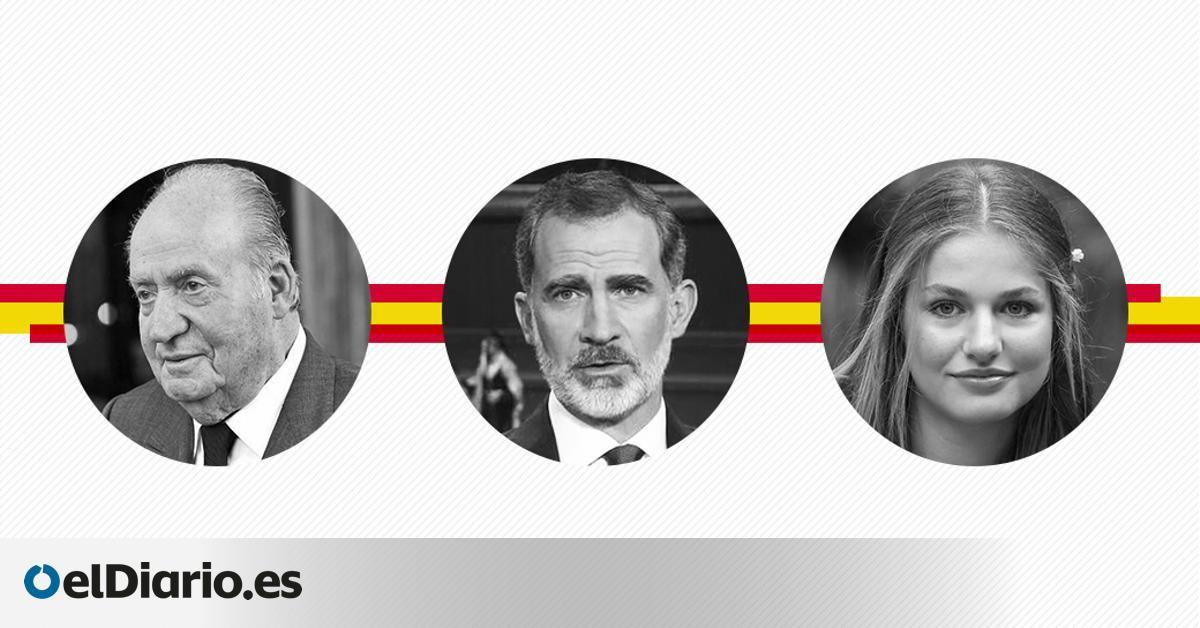
June 2, 2014 was presented as an unremarkable day, with the usual Monday press conferences at the political party headquarters. It had only been a week since the European elections had been held and with time to rest, it was time for reflection and accountability on the part of the PP and PSOE, which had suffered a setback that anticipated the end of the two-party system. But that day, by surprise, the then President of the Government, Mariano Rajoy, called an appearance in Moncloa: “His Majesty King Juan Carlos has just informed me of his willingness to renounce the throne and open the succession process.”
Two weeks later, Felipe VI was crowned as the new king. A rapid process thanks to the coordination between PP and PSOE, which sought to quickly avoid any debate on the continuity of the Monarchy. 2024 marks 10 years since the enthronement of the current king, a decade during which the institution has seen many of the scandals of the emeritus king uncovered, but also in which it has known how to bury them to ensure his continuity.
The abdication was announced on June 2, but it had been in the works for many months before. Juan Carlos had made the decision in January and had transmitted it to Mariano Rajoy in March and to the then leader of the PSOE, Alfredo Pérez Rubalcaba, a few days later. In his televised message, Rajoy hoped that the abdication would take place in “a serene climate, with tranquility and with gratitude to the figure of the majesty of the king.”
On June 11, Congress voted the Abdication law, a three-page document with a statement of reasons signed by the king himself and only two articles. It went ahead with great support and without much noise thanks to the collaboration of PP and PSOE, which then had almost 300 deputies in Congress. It was one of the reasons why the succession occurred at that precise moment, before the 2015 elections that caused an already foreseen disaster for the two major parties.
When Juan Carlos abdicated there was already some pressure for him to make that decision. The elephant hunting scandal, the Noos case and his poor health had fueled the debate on the succession, which intensified after his speech at the military Easter on January 6, 2014. The king got stuck, hesitated, confused words and had difficulty finishing the intervention. If there was anyone with doubts that the state of the then king did not allow him to continue leading the institution, they were cleared up that day.
What the Spaniards learned much later is that there were not only health reasons behind the decision. It was the first step in an operation aimed at saving the institution, already with a very low rating among its citizens, from a series of scandals that until then remained hidden, some of which surfaced in subsequent years.
In 2008, Juan Carlos had received a donation of 65 million euros in a Swiss account, supposedly coming from the Saudi Ministry of Finance for his intermediation so that Spanish companies could obtain the tender for the work of the AVE to Mecca. Over the next four years he withdrew various amounts and, when he was forced to empty the account at the direction of the Swiss bank, he put part of that money in the name of Corinna Larsen. He did it in 2012, the same year he traveled to Botswana with the businesswoman.
From the abdication to the first information about the king’s dirty laundry, we had to wait a few years. Specifically, Commissioner José Manuel Villarejo was arrested and recordings were seized that, either because his collaborators were leaking them to the media, or because they were working in the macro-case of the National Court, were forming an endless web of scandals related to Juan Carlos I.
There were years of daily news about the king’s relationship with Larsen, the intermediation of Villarejo and the CNI, the accounts in tax havens and the million-dollar donations that destroyed the image of the hero of the transition to portray a commission agent at the head of the Monarchy.
It was the revelation that there was an investigation by the Swiss Prosecutor’s Office into the alleged donation to Larsen that motivated the most drastic movements of Felipe VI, aware of the wear and tear that all this information was causing to the institution that now depended on him. On March 15, when the country was plunged into a state of alarm due to the coronavirus of uncertain duration, Felipe announced that he was withdrawing the constitutional allocation to his father and renouncing his inheritance. An English media had just published that Felipe was a beneficiary in that inheritance of an ‘offshore’ company that had been used to channel the donation to Larsen.
The firewall didn’t work. That same year, the Supreme Court Prosecutor’s Office opened an investigation into a possible tax crime committed by Juan Carlos – after his abdication, because he previously enjoyed inviolability – and Larsen was charged by the National Court.
Juan Carlos fled Spain two months after the investigation was opened, in a maneuver surrounded by opacity and that had the collaboration of the Government of Pedro Sánchez. The pressure on Felipe VI decreased as new information emerged about his father’s possible tax crimes, such as the use of opaque cards, accounts in his name in the tax haven of Jersey or a multitude of expenses paid by various businessmen.
Everything came to nothing. In March 2022, the Prosecutor’s Office closed the investigations opened against Juan Carlos I, considering that part of the crimes were prescribed or annulled due to the inviolability of the king. Furthermore, they accepted the tax regularizations made by the defense of the king emeritus on two occasions for a total value greater than five million euros, despite the fact that they occurred when he had already been notified that he was being investigated.
By then Felipe had already distanced himself, with the help of politicians and media related to the monarchy, from his father’s scandals. The prevailing discourse that for years had praised the figure of Juan Carlos I now mutated into a defense of his son, whose qualities that differentiated him from his father were highlighted. Felipe had isolated the Monarchy, first from the scandals of the Nóos case, and after whom he had embodied it for 40 years, an undetectable fraudster, according to the Spanish Prosecutor’s Office itself.
Any debate during this time about the continuity of the Monarchy has been quelled. The right has not wavered for a moment in its defense of the institution, and on the left, the PSOE has acted as a containment dam against the republican aspirations of its partners and a considerable part of its own militants and voters.
New times, same opacity
But in this time there have been no significant changes in the institution other than the exile of Juan Carlos, who little by little tries to normalize his visits without hiding that he wants to settle back in Spain. The Monarchy is no more transparent than at the time of those who used it to enrich themselves.
The new decree on the functioning of the Royal Household, approved by the coalition government in May 2022, is an incomplete exercise in transparency. An agreement was signed with the Court of Accounts, but its reports would not be sent to Congress and it is far from known the real expenditure of the institution. The Spaniards do not know how much the monarchy costs because their official budget (8.4 million euros) is increased above 14 due to the costs assumed by various ministries.
There has been no possibility during this time to address the inviolability of the king, the legal figure that allowed Juan Carlos to free himself from all judicial investigations for his possible crimes: “Inviolability is an issue that is in the Constitution and right now they would not arise.” sufficient majorities to address any reform,” the government settled in March 2022.
The opacity regarding the monarchy and the protection of the institution has reached the point that the Center for Sociological Research (CIS) does not ask about the assessment that citizens make of it since 2015. Then it obtained a 4.34 out of 10. Since then , nothing.
The abdication in 2014 was the first step in the operation aimed at saving the monarchy, which now has all its hopes placed on Leonor. The heir to the throne has already sworn the Constitution before the Cortes on the same day she turned 18 and there is no debate on the table about the survival of the institution, which seems assured. This, despite the fact that the majority of Spaniards want to decide with a ballot box on the continuity of the Monarchy.
Source: www.eldiario.es

